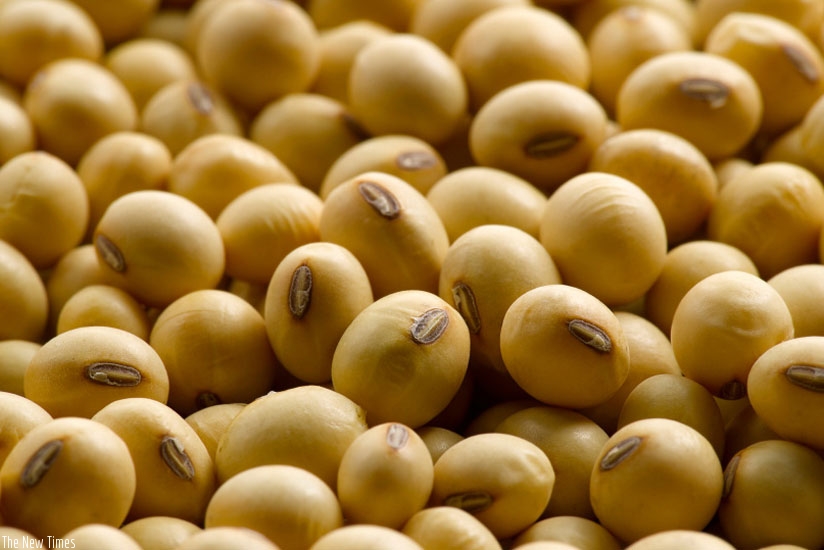Even with a limited budget, there should be no regrets for failing to find the perfect meal considering the high cost of meat, fish, chicken and eggs. We are endowed with alternatives around such as soy bean. No wonder strict vegetarians are unbothered about the high prices of animal proteins.


Even with a limited budget, there should be no regrets for failing to find the perfect meal considering the high cost of meat, fish, chicken and eggs. We are endowed with alternatives around such as soy bean. No wonder strict vegetarians are unbothered about the high prices of animal proteins.
Most baby foods and baked products such as bread, cookies and crackers contain soy which among other things improves texture, helps with moisture retention, extended shelf-life and reduction in breakage and crumbling.
Minerals and vitamins
Kigabaga Hospital nutritionist Isaac Bikorimana points out that whole soy beans contain large amounts of manganese, selenium, copper, potassium, phosphorus, magnesium, iron and calcium that are important in bone growth and development.
More to maintaining bones, Isoflavanoids in soy have also been linked to prevention of osteoporosis, a disease that arises with aging.
Soy has Vitamin B6, Folate, Riboflavin (B2), Thiamin (B1) and Vitamin K and a big portion contains 173 calories, with 9 grams of fat, 10 grams of carbohydrates (6 of which are fiber) and 17 grams of protein.
"This composition is the basis for using soy flour as a base ingredient in the manufacture of baby and therapeutic foods that are used to boost nutrition because it contains all 8 essential amino acids,” Bikorimana explains.
Fatty acids
Top of the composition is Omega 3 and 6 unsaturated fats with potential cholesterol lowering properties.
Nonetheless, manipulating soy yields several products and those who dislike diary milk have an option to substitute it with a soy derivative.
"When you express soaked soy beans there is production of soy milk which almost has similar properties like dairy milk,” Bikorimana adds.
He, however, complements recent research suggestions of people with thyroid problems avoiding soy, saying the key would be to ensure that there is also enough iodine in their diet as iodine promotes healthy thyroid functions.
Risk of enzyme inhibitors
However Joseph Mbabazi, a nutritionist, also reveals another important factor before using products from soy. He says that individuals need to take into account the phytates and trypsin inhibitors present in the beans.
"Phyates block absorption of important minerals whereas trypsin inhibitors slow back the action of the enzyme trypsin that breaks down proteins,” Mbabazi says.
Without trypsin, protein molecules would be too large to be absorbed across the lining of the small intestines.
Mbabazi therefore says fresh soy should be subjected to flash heating or extrusion cooking at high temperatures to inactive inhibitors.
Fatty acids and cholesterol
Soy beans are known to have reasonable composition of fats and unlike most grains, they contain 19 per cent of fats which is higher than that of nuts besides majority of these are unsaturated which deems them more beneficial.
Research shows that polyunsaturated, monounsaturated and saturated fats make up 63 percent, 23 percent, and 14 percent respectively of the fat in meaning saturated fats are the lowest.
The polyunsaturated fat content of soybean includes linolenic acid or Omega-3 fatty acids which are essential in reducing the risk of both heart disease and cancer.
Concerning cholesterol, research published in the New England journal of Medicine suggests that individuals with cholesterol levels of over 250 mg/dl would experience a significant reduction of 7 to 20 percent in levels of serum cholesterol if they substituted soy protein for animal protein. However cholesterol reduction was insignificant for individuals whose cholesterol was lower than 250 mg/dl.
Reducing heart attacks
The U.S. Food and Drug Administration (FDA) agrees that 25 grams per day of soy protein may reduce the risk of heart diseases. Health benefits of soy products may be due to their high levels of polyunsaturated fats, fiber, minerals, vitamins, and low saturated fat content.
From most studies however, although soy is a good substitute for high biological protein sources, most researchers agree that the composition can be much more enhanced by a combination of animal proteins and soy proteins.
Dangers of soy
lanti-nutrients prevent your body from absorbing essential minerals like calcium, magnesium, iron and zinc that could lead to osteoporosis.
lenzyme inhibitors, make it harder for your body to absorb protein. Both of these substances can give you abdominal pain, gas, nausea, cramps, and other gastrointestinal problems.
l emagglutinin, a substance that can promote blood clots.
l goitrogens, which can cause gout and thyroid problems.


